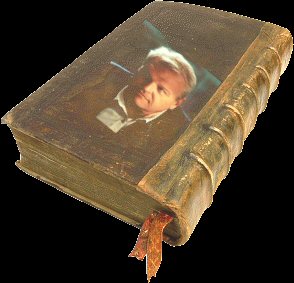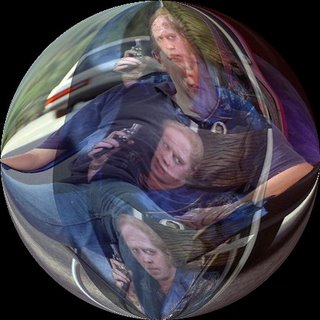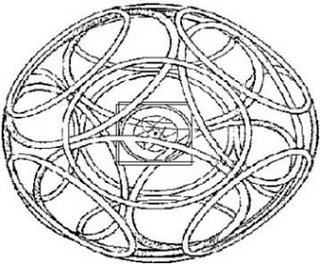The Book of Dennehy
 Normally when you see an albatross fly past your window at three in the morning, the most the event will elicit is a fleeting glance and, perhaps, a sneering contort of the lips. But such a seemingly benign incident ended up evoking much more than that one pre-dawn morn, a time when Aristotle O’Malley was just on the verge of drifting off to into sleep-land.
Normally when you see an albatross fly past your window at three in the morning, the most the event will elicit is a fleeting glance and, perhaps, a sneering contort of the lips. But such a seemingly benign incident ended up evoking much more than that one pre-dawn morn, a time when Aristotle O’Malley was just on the verge of drifting off to into sleep-land.The hardy and bellowing flaps of such a large seabird, even when obscured by double-glazing, can slice open that last receding moment of consciousness like a scalpel through gelatine, can force the mental glissade to abnegate any rights it has over the wellbeing of one’s night rest, and can puncture the release of daytime’s corroding alertness. This is exactly what it inflicted to O’Malley.
He was reclining on a divan in his library, a room that smelt like two hundred years of typos and paper-cuts, when the heaving, feathered comet blurred past the window. A sudden awakening is never a good thing, and the conventional mugginess was present when he arose to dander towards the portrait of blackness that was the window, the guilty matt canvas that had broken the spell of sleep previously indoctrinating his senses.
He was startled to witness a repeat of the prior occurrence, only this time rerun with full Technicolor visuals. The albatross flung it’s demented instinct back across the window, not once, but four or five times, before eventually rocketing itself into the equator of the glass sheet. One sonorous smash later, and the albatross was lying on the Persian carpet, dwindling life spasms, while O’Malley cowered behind a large paperback of The Interpretation of Dreams.
Gathering himself, he approached the winged nuisance. It’s final death tantrums had now immobilised, but to make sure it wasn’t going to get all slasher flick on him, he gave it a solid prodding with a nearby Queensryche album. It was most certainly not alive, yet something seemed to whine from it’s interiors. O’Malley also noticed a rectangular bulge in the abdomen, a protuberance that, while any ornithological knowledge he had once held had long gone stale, was indeed anomalous. Reaching for the neutral blades of a Swiss Army Knife, he grasped the steel and plunged it into the deepest recesses of this premature nemesis. What occupied the cavity was not what our wannabe-pathologist had expected. Reaching his woollen sleeves into the crimson pit, O’Malley yanked out a large hardback book.
He manoeuvred to a conveniently-close armchair and sat down to examine the tome. It’s weathered skin was crusty with entrails, but a quick wipe and a brown, leather membrane was exposed. A faded epithet seemed to graffiti the front-cover, some capitalised welcome message for the crypt beyond the gates, a sordid love-note misplaced by a senile printer in 1823. Squints telescoped along that darkened imprint and a clear sequence of letters was made visible. The hardback was named The Book of Dennehy.
A finger flipped and flapped over the rigid trapdoor of this unearthed literary world, pages unsheathed from a dusty necropolis, acknowledgements and dedications secluded in unbridled isolation, now unleashed, wandering around, blindly, like an old hermit just told his cave is going to be turned into a Starbucks. Odours snaking out into the firmament from unregulated creases; tiny tears in the script that scream about Romanticism and Coleridge getting marinated in a trout paste; chapter numerals that echo the last “fucks sake” to emanate from out of Goethe’s oak tree.
O’Malley, feeling alienated from those earlier sleep inclinations, decided that this chunk of literature ought to be investigated, and digested, and possibly disembowelled accordingly. Moving deeper and deeper into the linguistic mausoleum, the superfluous publishing data banished off into the past, and fingertips adequately moistened, he was ready to tackle the preface.
It was at this point that a tingling came over the arms of our virtuous explorer, like a shiver running the voodoo down an elbow, or a tinkling running a three-legged marathon across the barren wastes of epidermal hair. A tactile buzz doing things outlawed by common decency back before decency became common and common was but a lonely spinster watching old episodes of Renegade on cable; the sensation roaming, and darting, and descending, and escalating, and fellating, and fumbling, and then, gone, like a Gary Daniels movie hitting the bottom shelf at a velocity of mach seven.
And so, a dip into the shallow section of the pool, a sidestep through the fluff into the initial. Turns out that this belles-lettres was written some hundred-odd years ago, and was authored by exhibitionist alchemists - a vile collective who worshiped a god in the guise of Brian Dennehy, thus the title. The book was subdivided into a number of chapters, each seeming to differ from the last. Although numbered, O’Malley was unable to ascertain any logical pattern in the chapter arrangement.
Niggling curiosity harpooning neck hairs missed by a razor, he started into the first chapter. The prolixity of the prose hindered the intake only slightly, as paragraphs one-by-one were rammed into the senses like a Burger King meal ate by an innocent stomach. The words orated a tale of atheist rabbis, a quintet of, who held great lust for Richard Dawkins in their beards, and who spent their time writing letters of compliant to ecumenical pastors, scorning them for not considering Steve Guttenberg’s hairy chest as a palette for all chapel pulpits. The tale set out a description of everyday life, a rampage of detail and a guillotine of unnecessary tangents. Monotony conflagrated O’Malley, but yet he endeavoured on, pouring his determination over the settled documents laid in front.
The second chapter piggybacked on an almost absurd talent of prognostication, a forecasting predilection hitherto hidden by ancient appearance. The story here revolved around a Stalinist bank manager. This leftist tyrant braced the walls of commerce with an iron curtain of equity, and was, strangely, beloved by his subordinate proletariat. The dotted lines of the bank confined the narrative like a prison cell, for all action took place on the carpeted furnishings of that building. A rigorous array of set pieces, positioned for comedic compulsion, included the Stalinist disallowing a mortgage to a young man whose eyes were in bondage to Trotsky, and a scene where a cashier denounced the First International, only to lose her lunch-break as a result.
Crossing the borders of chapters two and three, O’Malley was again struck with an irregular physical commotion. A second swig of tingle on his limbs, but this time coupled with a bubbling under the skin, a poking and prodding of veins deeply buried by extremity. Like blood vessels acquisitioned by advertising, sold to the highest bidder, now space for billboards laced with promises of metaphysical amelioration if only the latest stain remover were purchased. Like derelict land donated to the vulgarities of mass-produced life, a factory for the manufacture of routine, for the assembly line of morality, running all day long, never ceasing for fear of free thought permeating the blind advance, an advance stationed by tradition, glued to the spot by custom, holding trepidation aloft, and drowning the last sighs of audacity and valour, those quietening murmurs of questions and healthy cynicism silenced forever.
But O’Malley continued. The next chapter read like a western written by Kafka. Dirtroad McGraw is a Danish cowboy living in a futuristic
The fourth chapter was immensely removed from it’s precursors. It presented what looked like an arbitrary list of “items bereft of Brian Dennehy”. As expected, this inventory stretched over vast chunks of page, enveloping tropics once set aside for it’s bulky mass to squirm on. From “goulash” to “counter-terrorism”, terms were systematically paraded; blocks of textual exclusion followed shimmering headings such as “mammals” and “legal symbols”.
Obviously this did not alight O’Malley. He was almost cascading back into that prior stupor, when a rumbling in the skin unsealed his beer-bottle of reverie. A pain pierced his senses, causing him to stand up to examine the responsible limbs under the omniscient luminance of the lamp. He could just about make out motions on his arms, miniscule swellings gesticulating unknown signs under his skin, traffic unregulated by society, an amber-lit rush forward, and a release of pent-up frustration. After a moment, the clandestine activity subsided, and he returned to the book.
The next chapter was another where preconceptions were eliminated, and the modern day predicating powers of the book were once again in full swing. It followed an adolescent, who spent many a summer afternoon on an Xbox360 message board, discussing over-priced games, dissecting the turn-based battle format, and criticising ‘noobs’ for their disregarding of the search facility. One day, after a mammoth session of tomb raiding, he went onto the board, nonchalantly, to see what new posts he could condemn with snide elitist language, but what happened was not expected. Post-login, he was magically transposed into his own avatar. Here life was not as comfortable as that of the outside; he had to do epic duel with adware programs, and painstakingly alter every ‘teh’ into ‘the’.
It was while reading this story that a rupture occurred. Wrenching himself from the gravitational field of the book, O’Malley again placed himself under the scrutinizing glow of the lamp. To his shock and horror, and astonishment and bewilderment, he saw a tiny anthropomorphic figure emerge from one of his pores.
Clutching his dissolving mental capacity, he torpedoed his eyes into a close adjacency with the asphalt of his left arm. It was indeed a diminutive human form, pulling it’s legs out of the natal pore from which it was born. Once free from the organic impound, it began walking about the vicinity. Startled, O’Malley could barely fathom this unprecedented marvel. He watched the infinitesimal being, first walking from pore to pore, then, apparently tired from physical activity, sitting down, using a hair as a backrest. It was while the creature was inert that O’Malley made an astounding discovery; the petite organism was none other than Brian Dennehy.
But before he could properly register this in his cranium, another miniature Dennehy popped out of another pore, this time further up his forearm. This one looked exactly the same as the firstborn. It too exhibited the fluffy jowls and tweed jacket so exemplarily showcased by Dennehy. Moving his other arm to attempt a brute homicide, like a good old spray of pesticide, he saw that his other arm had too borne a few Dennehys. Like their cousins on the limb opposite, they had quickly become exhausted by scuttling about, and had halted for a symphony of deep breaths.
With each passing second, new Dennehys materialized from deep cocoons, surfacing with the aged features of a long pregnancy. O’Malley was jolted into a corporeal coma, ever watching the labour-pains of his pores, but unable to do anything. Eventually there were hundreds of tiny Dennehys manoeuvring across the tarmac of his arms. Some had grouped together and were standing around talking. Alas, the baritone grumbles were inaudible to anyone not present in the microcosm.
Feeling a rising tide of nausea in his insides, O’Malley tried to muster the fortitude it would take to rid himself of this ailment, but every time he glanced at the flowering soil of his arms there were more and more Dennehys. Sitting down, the ink wells of shock stamped him with a blackout.
Aristotle O’Malley never woke up from that blackout. The mass birth of Brian Dennehys was continuous; a perpetual outflow gushed from out of every pore his skin had to offer. His body was consumed by this plague of Dennehys, first taking feast of his natural delicatessen, then building shacks in areas of decent amenities. Eventually, bars were constructed, as were fast food outlets and pool halls, bowling alleys and car parks. The civilisation of Dennehy, while primitive, prospered, and was soon putting ads in Variety, attracting some of the biggest names in





